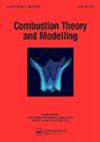Effect of ethanol enrichment and engine parameters on the performance of an HCCI engine fuelled with biodiesel/ethanol mixtures
IF 1.6
4区 工程技术
Q4 ENERGY & FUELS
引用次数: 0
Abstract
Based on models resulting from the merging of validated kinetic schemes, four reaction mechanisms were developed to describe the combustion of biodiesel-surrogate/ethanol blends in an HCCI engine. The proposed models were then compared to experimental data issued from a modified cooperative fuel research (CFR) engine which can be considered as an HCCI engine. The kinetic scheme displaying the best predictive capabilities, in conjunction with the single-zone HCCI code from the chemkin library, was used to investigate effects of ethanol enrichment and the variation of some important parameters, such as inlet temperature, relative air/fuel ratio and compression ratio, on the combustion and performance characteristics of the investigated HCCI engine. The blended fuels were formed by incrementally adding 10% of ethanol to the neat biodiesel mixture. The inlet temperature ranged from 320 to 420 K with a step of 20 K, whereas air/fuel and compression ratios were varied from 2 to 5 with a step of 0.5, and from 9 to 14 with a step equal to 1, respectively. The obtained data indicated that ethanol effects on the starting of combustion, combustion duration and indicated mean effective pressure were dependent on intake temperature, air/fuel and compression ratios.乙醇富集和发动机参数对生物柴油/乙醇混合燃料HCCI发动机性能的影响
本文章由计算机程序翻译,如有差异,请以英文原文为准。
求助全文
约1分钟内获得全文
求助全文
来源期刊

Combustion Theory and Modelling
工程技术-工程:化工
CiteScore
3.00
自引率
7.70%
发文量
38
审稿时长
6 months
期刊介绍:
Combustion Theory and Modelling is a leading international journal devoted to the application of mathematical modelling, numerical simulation and experimental techniques to the study of combustion. Articles can cover a wide range of topics, such as: premixed laminar flames, laminar diffusion flames, turbulent combustion, fires, chemical kinetics, pollutant formation, microgravity, materials synthesis, chemical vapour deposition, catalysis, droplet and spray combustion, detonation dynamics, thermal explosions, ignition, energetic materials and propellants, burners and engine combustion. A diverse spectrum of mathematical methods may also be used, including large scale numerical simulation, hybrid computational schemes, front tracking, adaptive mesh refinement, optimized parallel computation, asymptotic methods and singular perturbation techniques, bifurcation theory, optimization methods, dynamical systems theory, cellular automata and discrete methods and probabilistic and statistical methods. Experimental studies that employ intrusive or nonintrusive diagnostics and are published in the Journal should be closely related to theoretical issues, by highlighting fundamental theoretical questions or by providing a sound basis for comparison with theory.
 求助内容:
求助内容: 应助结果提醒方式:
应助结果提醒方式:


